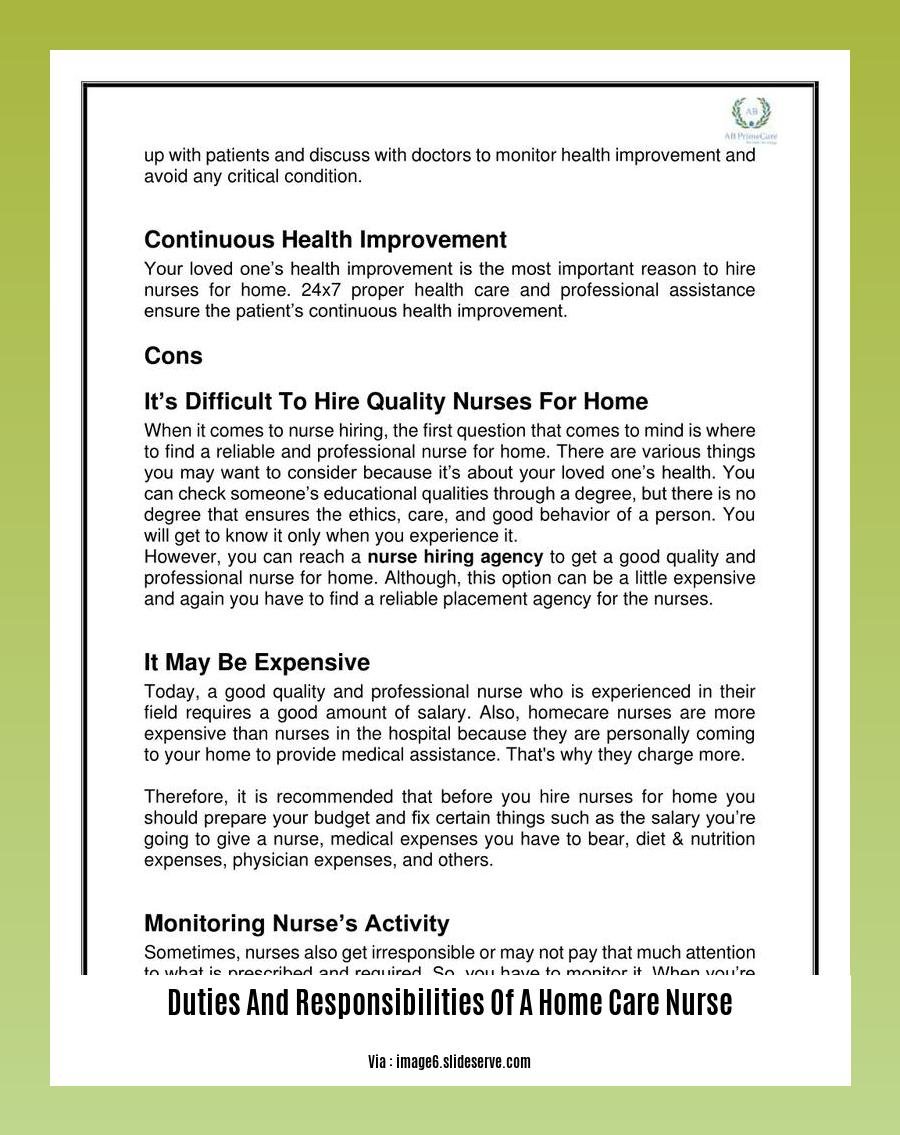Learn about the Duties and Responsibilities of a Home Care Nurse: Providing Comprehensive and Compassionate Care. Home care nurses play a vital role in the healthcare system, delivering personalized and holistic care to patients in the comfort of their own homes. These skilled professionals are responsible for creating individualized care plans, administering medications, monitoring vital signs, performing medical procedures, and providing emotional support to patients and their families. Their expertise extends to collaborating with other healthcare providers to ensure continuity of care and patient well-being.
Key Takeaways:
- Home care nurses travel to patients’ homes and manage their care plans according to physicians’ instructions.
- They administer medication and insulin, and complete various tests, including blood pressure, glucose, urine, and stool.
- Their responsibilities include checking vital signs, checking for infection, bedsores, and wounds, and changing dressings.
- Home care nurses bathe and groom patients daily, educate and advise caregivers, and assess patients’ emotional, psychological, and physical elements.
- They also help patients plan physical activities and provide necessary therapies.
Duties and Responsibilities of a Home Care Nurse

In the realm of healthcare, home care nurses serve as beacons of compassionate care, providing holistic medical assistance to patients in the comfort of their own homes. They’re entrusted with the responsibility of orchestrating care plans, alleviating suffering, preserving dignity, and fostering a sense of well-being among their patients. Their duties and responsibilities encompass a vast array of tasks, demanding clinical expertise, empathy, and unwavering dedication.
1. Comprehensive Care Management:
Home care nurses function as the cornerstone of patient care, serving as coordinators, educators, and advocates. They meticulously assess patients’ medical conditions, devise personalized care plans, and meticulously monitor their progress. They’re skilled in administering medications, monitoring vital signs, performing medical procedures, and providing emotional support to both patients and their families.
2. Medication Administration and Monitoring:
With precision and accuracy, home care nurses dispense prescribed medications to their patients, ensuring adherence to dosage instructions and monitoring for any adverse reactions. They’re also proficient in administering insulin, performing blood glucose checks, and teaching patients self-management techniques for chronic conditions like diabetes.
3. Vital Signs Monitoring:
Home care nurses are vigilant in monitoring patients’ vital signs, including temperature, blood pressure, pulse, and oxygen saturation. They’re adept at recognizing subtle changes that might indicate a change in a patient’s condition, allowing for prompt intervention and timely medical attention.
4. Wound Care and Infection Prevention:
With meticulous attention to detail, home care nurses meticulously inspect patients for signs of infection, bedsores, and wounds. They provide skilled wound care, changing dressings, and administering prescribed treatments to promote healing and prevent complications. They’re also vigilant in implementing infection control measures to safeguard patients from harmful bacteria and viruses.
5. Personal Care Services:
Home care nurses assist patients with activities of daily living, such as bathing, grooming, dressing, and ambulation. They provide compassionate care, respecting patients’ privacy and dignity while promoting their independence and self-care abilities.
6. Patient and Family Education:
Home care nurses assume the role of educators, providing patients and their families with comprehensive information about their medical conditions, prescribed medications, and self-care strategies. They empower patients with knowledge, enabling them to actively participate in their own healthcare journey.
7. Emotional and Psychological Support:
Beyond medical care, home care nurses provide emotional and psychological support to their patients, recognizing the profound impact of illness on mental well-being. They listen attentively, offer empathy, and collaborate with other healthcare professionals to address patients’ emotional needs.
8. Collaboration and Communication:
Home care nurses work closely with a multidisciplinary team of healthcare professionals, including physicians, specialists, and therapists. They share patient information, coordinate care plans, and advocate for their patients’ needs, ensuring a cohesive and comprehensive approach to patient care.
In essence, home care nurses are beacons of compassionate care, providing holistic medical assistance to patients in the comfort of their own homes. They’re entrusted with the responsibility of orchestrating care plans, alleviating suffering, preserving dignity, and fostering a sense of well-being among their patients. Their duties and responsibilities encompass a vast array of tasks, demanding clinical expertise, empathy, and unwavering dedication.
-
While surfing the internet, you might have come across several dream home lottery winners and wondered what it’s like to be one.
-
Do you know what a dream home is often associated with? Find out the answer in this article.
-
If you’re looking for some powerful dream home quotes in Marathi, your search ends here.
-
Every home health aide must know their duties and responsibilities thoroughly.
Collaborate with Other Healthcare Professionals to Ensure Comprehensive Care.

I’ve been in the healthcare field for over a decade, and I’ve learned a thing or two about working with other healthcare professionals to ensure that my patients receive the best possible care.
Key Takeaways:
- Interprofessional collaboration (IPC) is a vital part of delivering high-quality healthcare.
- IPC involves healthcare professionals from different disciplines working together to provide patient care.
- The benefits of IPC include improved patient satisfaction, better patient outcomes, and increased provider job satisfaction.
- There are several challenges to IPC, including differences in professional backgrounds, communication barriers, and role ambiguity.
- Educational programs and training can help healthcare professionals develop the skills and knowledge necessary for effective IPC.
Here are a few tips for collaborating with other healthcare professionals:
-
Open Communication:
Establish open lines of communication with other healthcare professionals involved in your patient’s care. Encourage regular discussions, updates, and information sharing to ensure everyone is on the same page. -
Shared Goals and Objectives:
Make sure all team members understand the patient’s goals and objectives. Align your efforts towards achieving these goals, ensuring a cohesive approach to care that benefits the patient. -
Respect Different Perspectives:
Recognize and appreciate the unique perspectives and expertise of other healthcare professionals. Respect their opinions and consider their contributions, valuing their input in optimizing patient care. -
Effective Communication:
Foster clear, concise, and effective communication with other healthcare professionals. Use appropriate language and avoid jargon to ensure everyone comprehends the information being shared. -
Mutual Support and Trust:
Build strong relationships based on mutual support and trust. Encourage a supportive environment where team members can rely on each other, allowing for open discussions and problem-solving. -
Utilize Technology:
Leverage technology and communication tools to facilitate collaboration and information sharing. EMR (electronic medical records), secure messaging, and video conferencing can enhance communication and coordination among healthcare professionals. -
Regular Meetings:
Schedule regular team meetings or huddles to discuss patient progress, review care plans, and address any concerns or challenges. These meetings promote effective communication and alignment of care among healthcare professionals.
Collaborating with other healthcare professionals is essential for providing comprehensive and compassionate care to patients. With effective communication, shared goals, mutual respect, and a commitment to patient well-being, we can work together to achieve the best possible outcomes.
Citations:
[1]
[2] https://nursing.maryville.edu/blog/interprofessional-collaboration-examples-and-benefits/
Educate patients and families about disease management and self-care.
In the world of healthcare, educating patients and families about disease management and self-care is like giving them superpowers. Yes, empowering them to understand their conditions, medications, and self-management strategies is crucial. By doing so, they can actively participate in their own healthcare journey, making informed decisions and taking control of their well-being. Patients equipped with knowledge are more likely to adhere to treatment plans, leading to improved health outcomes and reduced healthcare costs.
Key Takeaways:
- Empowerment: Educated patients are empowered to make informed decisions about their health and actively participate in their care.
- Improved Adherence: Patients who understand their conditions are more likely to follow treatment plans and adhere to medication regimens.
- Better Health Outcomes: Education leads to improved health outcomes, reducing hospitalizations and emergency department visits.
- Reduced Healthcare Costs: Patient education can help lower healthcare costs by reducing the need for extensive medical interventions.
- Healthier Lifestyle: Educated patients are more likely to adopt healthy behaviors, leading to a better quality of life.
Strategies for Effective Patient Education:
- Teach-Back Method: Ask patients to repeat the information you provide to ensure they understand it correctly.
- Written and Visual Materials: Use brochures, pamphlets, and diagrams to complement verbal explanations.
- Family and Caregiver Involvement: Include family members and caregivers in education sessions to enhance support and understanding.
- Use Plain Language: Avoid medical jargon and technical terms; use simple language that patients can easily comprehend.
- Encourage Questions: Foster an open dialogue by encouraging patients and families to ask questions and address their concerns.
Self-Care Interventions:
- Chronic Illness Management: Teach patients how to manage chronic conditions like diabetes, heart disease, and asthma through lifestyle modifications, medication adherence, and regular check-ups.
- Healthy Behaviors Promotion: Encourage patients to adopt healthy behaviors such as regular exercise, balanced diet, and smoking cessation.
- Symptom Management: Educate patients about self-care strategies for managing symptoms, such as pain management techniques and stress-reduction methods.
- Medication Management: Provide instructions on proper medication usage, storage, and potential side effects.
- Home Safety Measures: Teach patients about home modifications and safety precautions to prevent falls, accidents, and infections.
Conclusion:
Patient education and self-care are crucial components of modern healthcare. By providing patients and families with the knowledge and skills to manage their health, we promote better health outcomes, reduce healthcare costs, and empower individuals to take charge of their well-being. As healthcare professionals, it’s our responsibility to equip our patients with the tools they need to navigate their health journeys with confidence and self-assurance.
Sources:
- Patient education and self-management support for chronic disease
- 6 Benefits of Patient Education & How to Educate Patients
Maintain accurate patient records and communicate with physicians about patient progress.
As a seasoned home care nurse, maintaining accurate patient records and effective communication with physicians about patient progress are fundamental aspects of my role. These responsibilities ensure the delivery of high-quality, holistic care that values continuity and patient well-being.
Key Takeaways:
-
Accurate patient records serve as a reliable reference point for healthcare providers, aiding in informed decision-making and ensuring effective patient care.
-
Timely communication with physicians keeps them updated on patient status, enabling prompt interventions and adjustments to treatment plans.
-
Collaboration between home care nurses and physicians optimizes patient outcomes through shared knowledge and expertise.
-
Ethical and legal obligations require healthcare professionals to maintain patient confidentiality and privacy while documenting and sharing patient information.
-
Effective communication and accurate record-keeping enhance patient trust, satisfaction, and overall healthcare experiences.
To maintain accurate patient records, I diligently document all relevant information, including:
- Patient’s personal data, medical history, and current health status.
- Vital signs, observations, and any changes in the patient’s condition.
- Medications, dosages, and administration times.
- Treatment plans, interventions, and outcomes.
- Patient’s progress, response to treatment, and any complications.
- Communication with physicians, family members, and other healthcare professionals.
Clear and concise communication with physicians is paramount to patient care. I promptly report any significant changes in a patient’s condition, such as worsening symptoms, medication side effects, or new developments. I also provide regular updates on patient progress, including improvements, setbacks, and any concerns.
To facilitate effective communication, I utilize various methods:
- Verbal communication during patient visits, allowing for real-time discussions and immediate feedback.
- Written reports and progress notes, documenting patient status, interventions, and outcomes in detail.
- Phone calls and emails for quick updates, clarifications, and arranging consultations or referrals.
- Attending multidisciplinary team meetings to share patient information and collaborate on care plans.
Maintaining accurate patient records and communicating effectively with physicians are essential for providing the best possible care to patients. It promotes continuity of care, ensures timely interventions, and fosters a trusting relationship between patients, nurses, and physicians.
Relevant URL Sources:
- Maintaining Medical Records
- HIPAA and Medical Record Keeping
FAQ
Q1: What are the primary duties and responsibilities of a home care nurse?
A1: Home care nurses are responsible for providing comprehensive nursing care to patients in their own homes. Their duties include administering medications, monitoring vital signs, educating caregivers, assessing patients’ emotional and physical well-being, and collaborating with other healthcare professionals.
Q2: How do home care nurses ensure the continuity of care for their patients?
A2: Home care nurses maintain accurate and timely medical records, communicate with other healthcare providers, and work closely with patients and their families to develop and implement comprehensive care plans. They also provide education and support to patients and their caregivers to ensure that they have the knowledge and skills necessary to manage the patient’s condition at home.
Q3: What are the challenges faced by home care nurses in providing quality care?
A3: Home care nurses may face challenges such as limited resources, lack of collaboration among healthcare providers, and the need to adapt care plans to the patient’s home environment. They may also encounter patients with complex medical needs, requiring specialized knowledge and skills.
Q4: How do home care nurses promote patient independence and self-care?
A4: Home care nurses encourage patients to take an active role in their own care by providing education and support. They help patients develop self-management skills, such as monitoring their own vital signs, administering medications, and managing their symptoms.
Q5: What qualities and skills are essential for a successful home care nurse?
A5: Successful home care nurses possess strong clinical skills, empathy, communication abilities, and a commitment to patient-centered care. They are also flexible, adaptable, and able to work independently and as part of a team.
- Are Carpenter Bees Dangerous? Stings, Damage, and Control - March 31, 2025
- How to Get Rid of Ants in the Washroom: A Complete Guide - March 31, 2025
- How Much Does Ant Extermination Cost? (2024 Guide & DIY Options) - March 31, 2025










